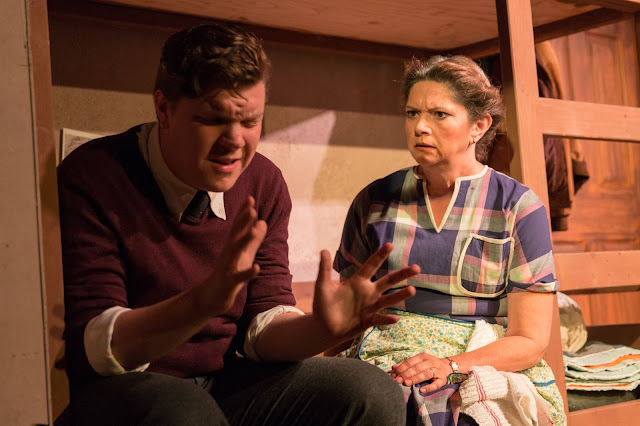Stranger in a hilariously strange land
by Michael
Dresdner
 |
| L to R: Blake York, Charlie Stevens All photos by Dennis K Photography |
On the opening
night of their 100th year, Tacoma Little Theatre pulled out all the
stops with an intensely funny and perfectly executed Larry Shue comedy called
The Foreigner. It was so good that even this jaded, “seen it all before”
reviewer was laughing out loud at the antics of director Cassie Pruitt’s wonderful
ensemble cast.
Sadly, I can’t
tell you much about the play’s plot because it would ruin a lot of the very
unexpected humor, so I’ll do what everyone else does; just offer you the set-up
and hope you will trust me enough to go see it mostly on my say so.
 |
| L to R: Mikel Michener, Jen Aylsworth |
S/Sgt. Froggy
LeSueur (Mikel Michener) arrives at a Georgia hunting lodge to drop off his
friend Charlie Baker (Blake York) for a few days while he goes on maneuvers. The
ultra-shy Charlie is horrified at having to converse with strangers, so Froggy tells
their host, Betty Meeks (Jen Aylsworth) that Charlie is a foreigner and speaks
no English at all. She finds that thrillingly charming (why, honey child, she
just never met no foreigner before) and quickly misinterprets every little
action as stuff that’s plumb natural for foreigners, no matter how unlikely and
absurd it is.
Rev. David
Marshall Lee (Cody Wyld Flower) and his fiancé, Catherine Simms (Caiti Burke)
both take that as a free pass to be able to speak freely about private matters
both around him, and in Catherine’s case, to him. Lee wants to buy the old
lodge with Catherine’s money and turn it into… See, there you have it. One of
the those things I mentioned that I can’t give away lest I ruin the comedy.
 |
| L to R: Jen Aylsworth, Cody Wyld Flower, Charlie Stevens, Brian Cox |
The rather
duplicitous Reverend Lee is, we’ll soon find out, not quite so nice as he
pretends to be when he shows up with a completely reprehensible stereotypical Southerner
named Owen Musser (Brian Cox) in tow. There’s little reward in playing a truly
bad guy. The better you play the role, the more everyone genuinely hates you,
and Owen was outstanding at being despicable. From the moment Cox stepped on
stage he crafted both a thoroughly obnoxious and a completely recognizable archetype.
 |
| L to R: Charlie Stevens, Caiti Burke, Cody Wyld Flower |
Last, but
certainly not least, is Ellard Simms (Charlie Stevens), Catherine’s mentally
challenged brother. Gangly, a bit twitchy, and delightfully funny, Stevens made
Ellard captivatingly believable. His breakfast scene with Blake during Act I was
magnificent. Riddled with non-stop sight gags and almost no dialogue, the “slow”
boy hilariously tries to communicate with this foreign tongued stranger, who
plays along ad absurdum. It was both reminiscent of and better than the best
work Laurel and Hardy ever did.
 |
| L to R: Caiti Burke, Blake York, Jen Aylsworth |
The key to this
play is Charlie Baker, and Blake York hit that role right out of the park. With
his range of facial expressions, body language, and grab-bag of strange voices
and actions, he created a character that you couldn’t take your eyes off of,
and couldn’t stop laughing at.
Each of these
performers would have been justifiably praised on their own, but Blake’s work
as Charlie was so outstanding that he actually overshadowed much of this
exceptional ensemble. How good was he? Normally I despise standing ovations
because they’ve become so overused, but when Blake stepped out on stage for his
bow, he got one that was richly deserved.
Not content
simply to act, Blake York also designed the beautifully realistic set (abetted
by the talented scenic artist and painter Jen York) but then we’ve known for
some time that Blake has pretty much captured the “best set designer in the
area” title already. Add that to his skill as a director and you have a very
different sort of theatrical triple threat.
Jeffery Weaver
did his usual top-notch job on props, set dressing, hair, and makeup. Ditto for
Michele Graves’ costumes, Niclas Olson’s lighting design, and Chris Serface’s
sound design. In other words, the technical side was well up to the challenge
of this extraordinary cast.
Opening night was
sold out. When word gets out about this triumph, every other night will be as
well. Trust me; go see this one. It’s hard to imagine a more wonderfully
hilarious evening.
The Foreigner
Sept. 14 to 30,
2018
Tacoma Little
Theatre



